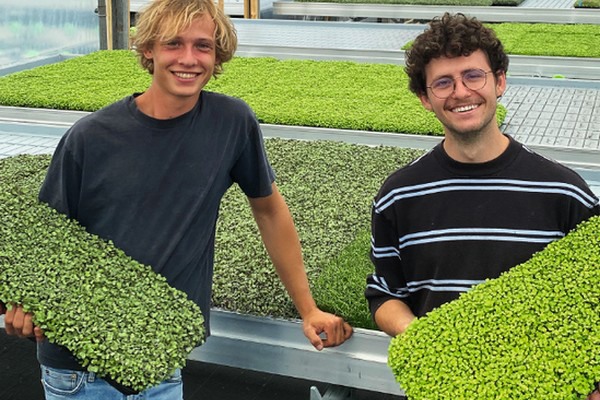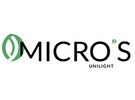Growing on potting soil instead of hydroponics, greenhouse heating with fuel oil, no high-tech and two young entrepreneurs without a degree. It seems like an impossible venture, but the opposite is true. This is the story of Micro's Unilight's "down to earth" approach, culminating in a social project.

In 2021, 20-year-old Cesar van der Spurt decided to quit college. After a stay in Egypt, he came back with the idea of growing microgreens: young vegetable plants packed with healthy substances. He saw this as an opportunity to help people eat healthier. With Yuval Depicker, he converted a sea container into a vertical farm near Ghent. Their focus was first on private individuals, but soon they turned to the professional market, with cresses grown on potting soil, delivered to restaurants.
The shipping container gave way to a spacious greenhouse, and the product is now cut and delivered to catering suppliers in Flanders and the southern Netherlands. "The switch to a greenhouse has increased efficiency tremendously," says Cesar. Where they used to pay €500 a month in electricity for 30 kilos a week, they now harvest ten times as much for only €50 extra a month. Sunlight is free, and they achieve higher efficiency with a roller container system from the Netherlands. For further automation, they are still looking for investors.
Micro's Unilight grows completely residue-free microgreens, despite not being certified organic because the roots are not in open ground. "We don't use plant protection products, and we like to communicate that to our customers," says Cesar. Their pot-grown microgreens' nutritional value and taste are higher than those from hydroponics.
To the professional market, Micro's supplies eight cress mixes and a single series, and to retail, particularly supermarkets around Ghent, two types of mixes. "Microgreens are still quite unknown to the general public, so we keep it simple and clear for the consumer," he says.
With a range of fifteen cresses and a focus on mixes, Micro's Unilight offers a price advantage. This makes their cresses attractive to sandwich stores. "We offer mixes that are not much higher in price than regular lettuce. This allows us to compete with conventional leafy vegetables and enter a new market. We also welcome exporters," Cesar said.
In addition to their commercial activities, Micro's Unilight also has a social purpose. "Healthy food acts as medicine for the body. In healthcare facilities, the nutritional value is often substandard. Therefore, for every twenty trays sold, we donate one to care institutions," Cesar concludes.
Cesar Van der Spurt Micro's Unilight
Micro's Unilight
Wittepaalstraat 27
9051 Afsnee (België)
T: +32 499 155 536
[email protected]
www.micros-unilight.com
